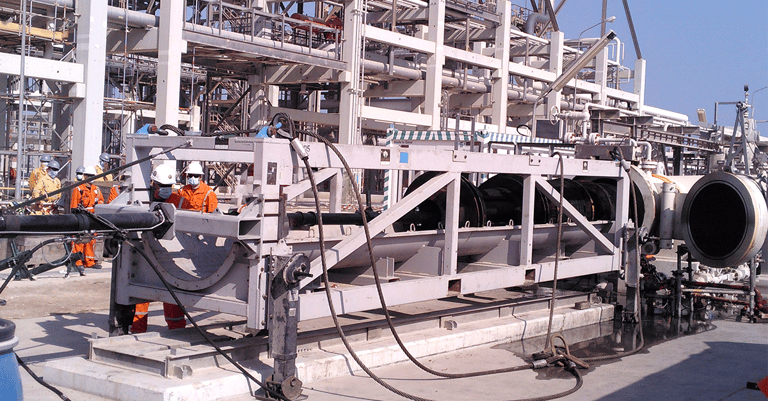
STATS Group was contracted by the largest LNG producer in the world to provide isolation and reinstatement leak-testing of a 38” sour gas export pipeline in Qatar. STATS supplied two DNV GL type approved Remote Tecno Plugs® to provide a fully monitored leak-tight isolation, which facilitated the safe hot work modification of 2” bypass pipework connected to the gas export line around the 38” emergency shutdown valves.
To fully assess the pipeline isolation project, an engineering study and site-survey was conducted to determine the safest method of carrying out the isolation and gather critical pipeline information. Following the study, STATS proposed the use of two 38” Remote Tecno Plugs with leak test modules, to provide fail-safe double block isolation and subsequent reinstatement leak-testing of the pressurised pipeline.
Key to the project was a piggability study completed by STATS which analysed all the pipeline features from the launcher to the isolation location to ensure the pigging route was suitable for the Remote Tecno Plugs to safely traverse in both directions without issue.
As part of the project, STATS conducted a full client witnessed Factory Acceptance Test (FAT) on both Remote Tecno Plugs to match the exact onsite conditions. Upon successful completion of all FAT operations the equipment was mobilised to site ready for the shutdown. Once the Remote Tecno Plugs arrived at the gas plant and completed their pre-deployment checks, the first isolation tool was loaded into the launcher and pigged a short distance into the pipeline. This allowed the launcher to be depressurised and the second Remote Tecno Plug was then loaded into the launcher ready for both isolation plugs to be pigged to straddle the valve and bypass pipework. The isolation tools were successfully pigged with water through the pressurised pipeline and tracked to an excavated section of pipeline at the valve location. Despite the pipeline being buried 3m below the ground, tracking and communication was maintained throughout the entire pigging operation.
Once the first isolation plug was pigged 500m and accurately positioned using through-wall communication, pigging was stopped. A bypass system in the pigging module of the Remote Tecno Plug was opened which allowed the rear isolation plug to be pigged forward a further 30m without moving the plug in front. This allowed the rear Remote Tecno Plug to be accurately positioned before both isolation plugs were set. Both isolation plugs were then hydraulically activated to engage the locks and dual seals against the pipe wall. Communication was achieved using an extremely low frequency (ELF) inductive system which sets and monitors the Tecno Plugs throughout the isolation. As part of the isolation barrier proving sequence, each seal was tested independently with full pipeline pressure in the direction of the expected pressure differential, proving both seals of the double block isolation were leak-tight. The annulus between the Remote Tecno Plug seals was then vented to ambient to create a zero-energy zone. This was then subject to a 12 hour isolation stability hold period before the ‘Isolation Certificate’ was issued.
With the double block isolation verified, the pipeline between the Tecno Plugs was drained and purged providing safe worksite conditions to remove the old bypass pipework around the valve and weld new pipework in place. Throughout the modification and hot work activities the Remote Tecno Plugs were constantly monitored and remained stable for the full 9 day isolation period, isolating 80 bar pressure from the upstream and downstream pipe sections.
In order to provide an isolation and reinstatement test, each Remote Tecno Plug was configured in a four-module arrangement, which included an isolation module, two remote control modules and a leak-test module. Once the bypass modification was completed, the leak-test module on the rear of each Tecno Plug was activated to create a barrier to enable a 149 bar reinstatement leak-test between the isolation plugs to confirm the new pipework integrity.
Upon completion of the reinstatement leak-test, the pipeline pressure was equalised allowing the Remote Tecno Plugs to be hydraulically unset and pigged back to the launcher. Each isolation plug was then removed from the launcher before transporting back to STATS facility in Qatar.
Alasdair Arthur, Project Engineer for STATS Group in Qatar, said: “The isolation scope was completed as planned, enabling the bypass pipework modification to be completed incident-free and within the planned shutdown. The successful delivery of the project is testament to the teamwork and good communication between all parties.”
Vikas Shangari, General Manager for Qatar, added: “Utilising the Remote Tecno Plugs provided the operator with a very high value proposition and supported their progress towards sustainability goals by reducing the need to depressurise or flare 80 km of sour gas inventory from the 38” trunkline. The double block isolation provided safety assurance to carry out the hot works which improved plant integrity, leading to a reduced shutdown duration and increasing operational performance”.
